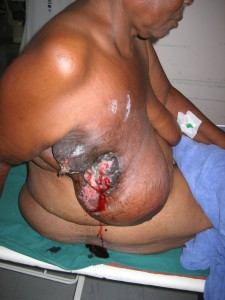During my visit to Zimbabwe in March 2011 I met a young woman who’d been diagnosed with breast cancer several years earlier. Surgeons in Harare performed a mastectomy, and she lost her left breast. I asked her if she told others in her village about her illness.
No, she said. She didn’t want to tell anyone outside her family about her breast cancer. “I only wanted my family to know: my husband, his mother and father and family; on my side: my mother, father, my brothers and sisters. Besides that, I didn’t want to tell anybody since in our culture, most people will go around mocking you. They will say, ‘Look at that woman, she is no longer normal. She is surviving with only one breast. She no longer has another breast.’”
Her words brought to mind people with AIDS I’d met during earlier visits to southern Africa who were affected by stigma. Some had isolated themselves in shame from friends and family; some were shunned by the community; one woman refused to go to the clinic for a chronic cough fearing that if she had TB, friends and family would say she had AIDS and reject her.
To stigmatize someone is to scorn or reject them because they possess some undesired trait. Stigma arises from fear, denial, myths and prejudices, and from a lack of knowledge about a disease. Stigma leads to alienation, rejection, ostracism and isolation of people with the disease, and, often, of their caregivers, family and children.
Sadly, a Zimbabwean doctor notes that still today stigma adds to the suffering of many people with AIDS…and for people with cancer, as the young woman indicates.
Serious illness always brings suffering. It can include pain, disability, anxiety, economic need, and family disruption. The degree of suffering is still greater if adequate medical care is unavailable.
Stigma compounds this misery still further. It is particularly cruel because it is inflicted by the community and often by friends and family members—the very people who should want to aid the sick and support the caregiver.

Finding breast cancer early and getting surgical treatment (and chemotherapy, when possible) can prevent the disease from progressing to this advanced stage. "We see such cases again and again. The same goes for cancer of the cervix," says a doctor in Zimbabwe. Palliative care--pain control--in Zimbabwe is limited to mild analgesics, with morphine almost entirely unavailable.
Stigma affects the healthy, too. Upon seeing the painful effects of stigma, a previously healthy person may delay seeking medical care or deny that they—or a family member—are sick. Delaying treatment makes successful treatment more difficult, and it can help spread infectious diseases such as TB and HIV/AIDS. If a woman who suspects she has breast or cervical cancer delays seeing a doctor, her cancer will progress and worsen.
We can all act to end stigma and the unnecessary suffering it causes by practicing compassion.
Many people incorrectly believe that compassion means taking pity on someone. But, as Karen Armstrong points out in her book Twelve Steps to a Compassionate Life, compassion is derived from Latin and Greek words that mean “‘to suffer, undergo, or experience.’”
“‘Compassion’ means ‘to endure [something] with another person,’ to put ourselves in somebody else’s shoes, to feel her pain as though it were our own, and to enter generously into his point of view.”
Both the Golden Rule—Do unto others as you have others do unto you—and the Christian maxim to “Love your neighbor as you love yourself” are expressions of compassion. They tell us to use our feelings as a guide to our behavior toward others.
How do we do that in daily life? Armstrong suggests that every time we are tempted to say something unkind or vile about someone, we first ask ourselves, “‘How would I like this said about me and mine?’” and then refrain from making the unkind statement.
To encourage compassion globally, Armstrong initiated the Charter for Compassion. Practicing compassion can help political leaders, police and others in authority develop humane policies and practices. But it is imperative for doctors, nurses, aids, caregivers and community home-based care volunteers. Compassionate medical care encourages the sick in the community to seek help. Compassionate healthcare workers are more likely provide empathetic care and less likely to divulge private health information such as a patient’s diagnosis.
Armstrong also raises a less obvious aspect of compassion: compassion for ourselves. To “love our neighbor as we love ourselves” supposes that we do in fact love ourselves, but for many reasons we might not. We might instead castigate ourselves for shortcomings, feel self-hatred, or hold ourselves in contempt.
As the doctor’s email notes, this can happen in people with HIV/AIDS:
“Stigma is also a problem for parents with children with HIV, especially teenagers. Parents find it extremely difficult to tell their children about their status, how the kids got HIV through vertical transmission, and how their lives will be affected. In some cases parents with kids taking ARVs have lied to them and told them the medication is for congenital heart problems.”
Also:
“…once [HIV/AIDS patients] are physically affected or they test HIV positive, they move away from the family. They blame themselves and look down upon themselves.”
Who can know the anguish and depths of sorrow of these parents? Or of the self-hating person with AIDS? Compassion for oneself can be one step in easing such grief.
As we forgive friends for their mistakes, we can forgive ourselves. We can remind ourselves of past kindnesses we have shown to others, the good we have done in our lives and the good we can resolve do in the future. If we treat ourselves kindly, we are likely to treat others kindly, too.
Becoming a compassionate person is a lifelong project, Armstrong writes. “It is not achieved in an hour or a day. Nearly every day we will fail, but we cannot give up; we must pick ourselves up and start again.”
By practicing compassion, Armstrong writes, “Every man or woman in the street can become a force for good in the world.” Applying that good to the sick and the affected can end stigma and improve healthcare.
Be well, everyone. And compassionate…Darrell

Thank you for this breast cancer article awareness. An impressive thought “Love your neighbor as you love yourself”. Breast cancer is a curable disease. We should help through breast cancer care charity programs.
Thank you for your comment. Yes, charity programs for needy women undergoing treatment for cancer would be helpful. Kindness toward women with cancer — and men — is critical to help eliminate the stigma of these diseases. A women who detects a suspicious lump in her breast should see a doctor for further examination. The lump might prove to be nothing to worry about, but if it is cancer, detecting the lump early and removing it soon are important to improve the chance of cure and for a better quality of life after treatment. Encouragement and assistance from family and friends is truly important for a woman treated for breast cancer. And also cervical cancer, particularly if she had to have her uterus removed. It is important for the woman to know, for friends and family to know, that even after breast surgery or a hysterectomy, a woman need not be embarrassed or ashamed. She is still a woman who can love and who needs love. As we all know, love and respect are essential to human life, to good health, to a good quality of life, and we must work together to ensure that cancer or another disease does not take them away from us.
Thank you again for your comment and keep well! …Darrell